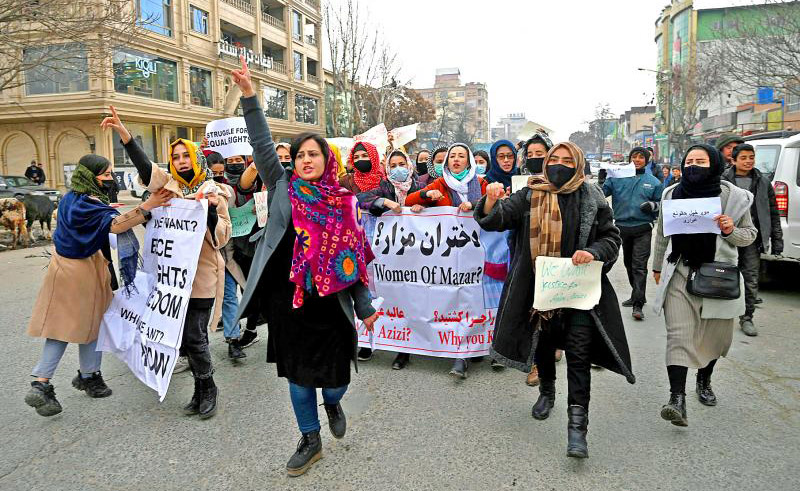Ruchi Kumar and Hikmat Noori
Taliban gunmen have raided the homes of women’s rights activists in Kabul, beating and arresting female campaigners in a string of actions apparently triggered by recent demonstrations.
Tamana Zaryabi Paryani and Parawana Ibrahimkhel, who participated in a series of protests held in Kabul over the last few months, were seized on Wednesday night by armed men claiming to be from the Taliban intelligence department.

Afghan women chant slogans and hold banners during a women's rights protest in Kabul on Sunday. Photograph: Wakil Kohsar/AFP/Getty Images
Shortly before Paryani and her sisters were detained, footage was posted on social media showing her screaming for help, saying the Taliban were banging on her door.
“Help, please, the Taliban have come to our home ... Only my sisters are home,” she says in the clip.
Associated Press footage from the scene on Thursday showed the apartment’s dented metal front door sitting slightly ajar. A witness said the armed men went up to Paryani’s third-floor apartment and began banging on the front door ordering her to open it.
The spokesman for the Taliban-appointed police in Kabul, Gen Mobin Khan, tweeted that Paryani’s social video post was a manufactured drama. A spokesman for the Taliban intelligence, Khalid Hamraz, would neither confirm nor deny the arrest.
He tweeted that “insulting the religious and national values of the Afghan people is not tolerated any more”, a reference to Sunday’s rally during which the protesters appeared to burn a white burqa, the head-to-toe garment that only leaves a mesh opening for the eyes.
Hamraz accused rights activists of maligning Afghanistan’s new Taliban rulers and their security forces to gain asylum in the west.
Similar raids were reported across homes of female protesters in Kabul. In another case, an Afghan protester whose name has been concealed to protect her, said she was physically assaulted and injured. She told the Guardian that the Taliban visited her house and “attacked” and “severely beat” her. Her whereabouts are now unknown.
“The Taliban had been patrolling near our homes since [Wednesday] afternoon. I talked to Tamana in the evening and then around 9pm I saw the video of her asking for help. We tried calling her from our burner phones, but her phone was switched off,” said Wahida Amiri, 33-year-old librarian and a fellow demonstrator, who is also on the run. “When we realised that they were raiding our homes one by one, the rest of us decided to go into hiding,” she added.
Since sweeping to power in mid-August, the Taliban have imposed widespread restrictions, many of them against women. They have been banned from many jobs outside the health and education field, their access to education has been restricted beyond sixth grade and they have been ordered to wear the hijab. The Taliban have, however, stopped short of imposing the burqa, which was compulsory when they ruled Afghanistan in the 1990s.
At Sunday’s demonstration, women carried placards demanding equal rights and shouted: “Justice!” They said they could be forced to wear the hijab. Organisers of the demonstration said Paryani attended the protest, which was dispersed after the Taliban fired pepper spray at the crowd.
Paryani belongs to a rights group called Seekers of Justice, which has organised several demonstrations in Kabul, including Sunday’s. Members have not spoken publicly of Paryani’s arrest but have been sharing the video of her.
The New York-based Human Rights Watch said that since taking over, the Taliban “have rolled back the rights of women and girls, including blocking access to education and employment for many”.
“Women’s rights activists have staged a series of protests; the Taliban have responded by banning unauthorized protests,” HRW said in a statement after Sunday’s protest.
The Taliban have increasingly targeted Afghanistan’s rights groups, and local and international journalists covering demonstrations have often been detained and sometimes beaten.
“It is obvious the Taliban are intensifying their attacks on the civic space, and more specifically on women who are pioneers of the civic space,” said Shaharzad Akbar, chairperson of the Afghanistan Independent Human Rights Commission.
“For over a month, we have seen the Taliban stifling dissent and intensifying their attacks on protesters across Afghanistan,” added Akbar. “Earlier we heard reports of protesters in Mazar being detained. There were also allegation of them being tortured, assaulted and harassed while in detention.”
Heather Barr, associate director of the women’s division at Human Rights Watch, said the Taliban’s reaction was a sign of fear. “It might seem hard to understand why the Taliban would have such a violent reaction to 25 women standing on the sidewalk, protesting peacefully. But their fears make sense when you see how powerful and brave these women are, to be stepping out again and again even in the face of escalating violence by the Taliban,” she said.
She urged the international community to step up in support of Afghan women. “The Taliban seem to be struggling on how to respond to this, and seem to have decided now that increased brutality is the answer, and that is a very frightening moment. The international community has to stand by these women.”
Associated Press contributed reporting



